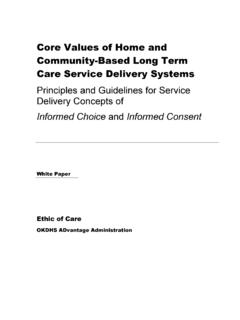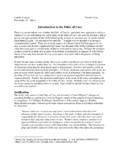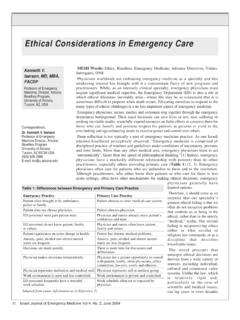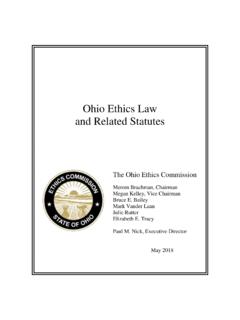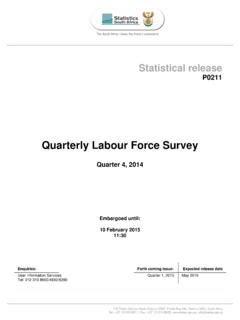Transcription of The Ethics of Pre-Employment Screening Through …
1 The Ethics of Pre-Employment Screening Through the Use of the Internet Michael Jones, Adam Schuckman, Kelly Watson Introduction A growing trend in the business world today is to use internet search engines and social networking sites to screen job applicants. Employers are often responsible for the actions of their employees and want to know as much information as possible about their employees before investing the time and money required to incorporate them into their respective businesses. With nearly 50% of resumes [containing] factual errors, 1 it is understandable why employers are erring to the side of caution.
2 In addition, employee theft and fraud cost US retail businesses more than $50 billion annually [and] the Bureau of Labor Statistics estimates that million to 2 million incidents of work place violence occur each year. 1 According to Joseph Vater, a partner at the law firm of Meyer, Unkovic & Scott LLP, negligent hiring lawsuits against companies whose employees commit a violent act have been on the This has increased the necessity for employers to perform background checks on job applicants, and many companies have turned to the internet to find all available information on their prospective However.
3 While it is important for companies to know who they are hiring, it is unethical to rely on information found on the internet in making hiring decisions. Background Traditional background searches generally focus on resume accuracy, criminal history, credit history, drug Screening , educational backgrounds, driving records, and reference verification. In 2000, 86% of employers performing background checks did so in order to verify employment history. Criminal records were sought 81% of the time, drug Screening 78% of the time, and reference checks were performed by 71% of employers performing background As a result of the Fair Credit Reporting Act ( FCRA ), accessing this information requires notification and permission of the applicant in Although this information can be found on the internet, the focus of social networking and internet searches generally does not focus on this information.
4 Social Networking Websites Recent surveys have indicated 26% of hiring managers have used internet search engines to research prospective employees, while 12% say they have used social networking One common site used in these searches is Facebook is a social networking site originally limited to use by the college community, but more recently open to the public at large. Founded in 2004, the site now has over 19 million registered users across over 47,000 regional, work-related, collegiate and high school networks.
5 6 While Facebook has many different controls allowing users to limit and/or block the viewing of their individual profiles, many users have not taken advantage of these controls leaving them vulnerable to searches performed by curious employers. Additionally, studies are currently being conducted to determine the judgments made regarding those individuals who do use current privacy controls to restrict access to their profiles. These studies hypothesize that blocked accounts create the impression that the individual has something to hide, and as such may result in the same judgments that will be argued as unethical later in following sections.
6 As the sixth-most trafficked site in the United States, Facebook is one of the primary networking sites used for Pre-Employment Screening . is similar in use, but to date has been far more widely used. In fact, MySpace has become the most popular social networking site in the world, with more than 95 million members. 7 Privacy controls are also available on MySpace, but similar to Facebook, the controls are not used by all members. One of the main differences between MySpace and Facebook is the ability of the user to personalize the appearance of their profile on MySpace.
7 Both MySpace and Facebook generally have areas for personal information such as age, religion, and relationship status; information that the FCRA prohibits from being used in making hiring decisions. Additionally, both sites allow the uploading of personal pictures and videos that can be shared with a select group of people (generally those accepted as friends), or with the public as a whole. Registered users on both sites also have the ability to join groups, which range in topic from support of a particular sports team, political issue, or hobbies the person may be interested in.
8 An employer searching an unrestricted profile has access to all of this information and can use it to decide which candidates to interview and/or hire. Google Another increasingly used practice for employment prescreening is to Google applicants. This term refers to searching for a person s name on the popular search engine Information found Through this search can vary greatly, but can include achievements, newspaper references, group affiliations, and legal proceedings that include the name of the individual being searched.
9 However, searches of individuals with common names may result in many results unrelated to the individual in question. Yet, by searching in a general location, employers may be able to find information relevant to the specific applicant. While this practice may reveal information about a potential employee, there is no guarantee the information found is factual or related to the individual being searched. Consequences of Internet Searches Over half of the applicants found on search engines and nearly two-thirds of the applicants found on social networking sites were not hired as a result of the information found on sites, such as , , and Among other concerns, these sites are not necessarily valid nor is there any way to ascertain the true identity of the person responsible for the information found.
10 Unlike the interview process, there is no personal connection when sifting Through information found on the internet and therefore there is a greater likelihood for the information to be taken out of context or misused. In many cases, the information used to determine the suitability of a prospective employee had little or no bearing on their ability to adequately complete the work. In fact, 8% of the potential employees that were rejected as a result of information found on search engines and networking sites were rejected because their screen name was As information on the internet is generally considered public, permission for these searches is not required and the information found need not be disclosed.
